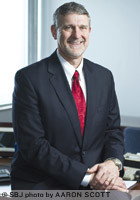Mike Finch has climbed the corporate ladder behind the scenes at City Utilities of Springfield, where he is now in charge of the company’s finances as associate general manager-finance and chief financial officer.
Given that the public utility has $500 million in annual revenues, Finch – who started with CU as a staff accountant in 1985 – has a full plate.
He became CFO and associate GM in 2010, and now is charged with managing the utility’s operating budget and five-year operating plan, which includes CU’s financial compliance and reporting, forecasting, asset management, payroll, accounts payable, price and rates, debt management and treasury operation.
As one of the public utility’s eight associate general managers, Finch reports directly to CU General Manager Scott Miller.
Finch pointed to his perspective gained during three years as administrator of SpringNet, an operational division of CU that offers ethernet services and operates SpringNet Underground, a data center beneath the city.
“I think that helps me have more of a global view of things and helps as we go through the process of trying to balance that operating plan between the financial targets that we have and the operational needs,” he said.
During his first year as CFO, Finch recommended to the Board of Public Utilities that CU remove $30 million in new debt and more than $50 million in budget projects from its 2011 operating plan after CU in 2006 issued $615 million in revenue bonds to fund the construction of the John Twitty Energy Center. The move has helped lead the utility to a AA bond rating from all three of the major rating agencies.
CU’s fiscal 2012 budget was projected with $528 million in expenditures and $524 million in receipts. Though those numbers – and higher expenses than revenues – may be difficult to reconcile at first glance, Finch said CU leaders felt that operational needs for projects submitted for fiscal 2010 were critical enough to risk a draw down in working capital. He noted, however, that utility leaders still project CU’s working capital to be above the minimum financial target at the end of the year.
Crafting a workable financial picture entails looking at revenue, fuel prices and customer usage, and by studying a hard-to-peg factor – the weather.
“Our revenues will fluctuate rather dramatically depending on fuel prices and weather. We really are a weather-dependent business,” Finch says. “We base our budget on normal weather. If there are fluctuations – like 2009, we had a very mild weather year – that has a very significant impact on our revenues.”
CU customers experienced mild temperatures in late 2011, and so far this year, conditions haven’t been extreme, Finch says. Natural gas prices also have been down, and those factors combined have led to the utility being under budget for 2012. CU, which starts its fiscal year in October, had projected revenues to be $135 million through January, but they actually fell $11 million below that target, he says.
With unknown fluctuations in any given fiscal year, Finch’s team makes three budget adjustments throughout the year to determine how much money project managers can use, or if they can use any at all.
In February, CU was undergoing its third adjustment, and Finch said it would likely lower its projected revenue figure, which started at $460 million Oct. 1.
To meet the fluctuations head on, Finch and his staff have to get creative.
Finch was involved in the development of an economic development rider approved unanimously by Springfield City Council during its Jan. 17 meeting. The rider allows for a five-year discounted electric rate schedule for new or existing businesses in town if they project additional usage of 300 kilowatts per month at peak times and an annual average of 150 kW. The discount starts at 25 percent and shrinks to 5 percent by the fifth year.
“It gives CU and the Springfield community another tool in the tool belt to help hopefully attract and retain our larger commercial/industrial customers.”
Click here for the complete 2012 Dynamic Dozen overview.[[In-content Ad]]
